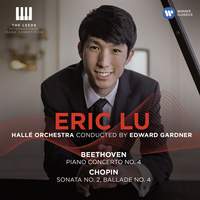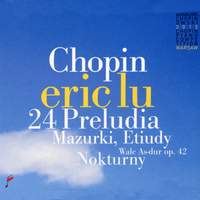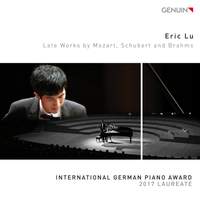Interview,
Eric Lu on The Leeds International Piano Competition
 Founded in 1961, The Leeds International Piano Competition is widely recognised as one of the most prestigious contests in the classical music world, with previous winners including Murray Perahia, Radu Lupu and Artur Pizarro; this year the coveted First Prize and Gold Medal (as well as the Terence Judd Hallé Orchestra Award) went to 20-year-old Chinese-American pianist Eric Lu, who held the audience and jury spellbound from his very first entry in Beethoven’s Fourth Piano Concerto in the finale.
Founded in 1961, The Leeds International Piano Competition is widely recognised as one of the most prestigious contests in the classical music world, with previous winners including Murray Perahia, Radu Lupu and Artur Pizarro; this year the coveted First Prize and Gold Medal (as well as the Terence Judd Hallé Orchestra Award) went to 20-year-old Chinese-American pianist Eric Lu, who held the audience and jury spellbound from his very first entry in Beethoven’s Fourth Piano Concerto in the finale.
I spoke to Eric shortly after his victory about his repertoire choices for Leeds, his approach to competitions in general, and his personal experience on the day of the final - as well as his budding relationship with Warner Classics, who entered into partnership with the competition this year and will release a live recording of Lu’s winning performance early next month.
What made you choose Beethoven’s Piano Concerto No. 4 for the final round of The Leeds, rather than something more obviously virtuosic?
For The Leeds, this time we were offered a choice between two groups of concertos, one Classical and the other Romantic; we all had to select two, and the organisers would then pick between them. The Beethoven was actually my first choice, but there was no guarantee I’d get to play it; my other choice was Chopin’s Concerto No. 2 in F minor. Beethoven’s Fourth, for me, is one of the greatest piano concertos ever written; it’s my favourite of his five, at the moment, and it’s just a miraculous piece in terms of the way he constructs it. Its moments of beauty and sense of pathos are extraordinary – but that also makes it difficult to play. It was a long, and at times not an easy, process of learning it and experiencing it and trying to get it to the level that I felt it deserved, and that process will continue...
And how did you select the pieces for each round? What factors did you have to consider when choosing repertoire?
In terms of the solo pieces, we were given completely free rein. We just had to figure out what we wanted to play and when we wanted to play it – in the first round (which wasn’t held in Leeds), the second round which was a 40-minute recital, or the semi-final. That was tricky because we had to incorporate a chamber piece; those again were from a list, but even then there was a great variety to choose from. We had to think about how they would fit together with the solo piece, and also of course to consider the timings: these really had to work out, because you could easily end up with 60 or 75 minutes of music, so all in all the repertoire-planning for Leeds was very complicated!
You have a history of successes at competitions of this kind, including fourth place in the International Chopin Competition aged just 17! Do you approach them the same as you would any other performance, or is there a different dynamic?
In a way yes, but in a way no. In terms of your vision of the piece, what you want to achieve, and what you’re thinking on stage, arguably no: I’m not going to change my interpretation (perhaps to something less controversial) because I think it will suit a competition. That’s not the way I think at all.
But of course when it comes to your mental preparation it’s very different; you know that this is a big event, a very important moment in your life. You might have spent years with some of these pieces – not in terms of planning for the competition, but just because they’re works that you’ve lived with for years. And the Leeds final was an especially high-pressure situation: it was being recorded and broadcast live, and in this case now it’s also going to be released with one of the most prestigious record companies in the world! So all of that does make it different, and there’s an added stress. But I always try to keep focused on exactly what I want to say, and what the music says, even when there’s a lot more going on behind the scenes.
Tell me a little about your relationships with your teachers - Robert McDonald, Jonathan Biss and Đặng Thái Sơn...
There’s so much to say about all three! With Robert, he’s surely one of the best teachers you could ever meet, and the ultimate help in terms of solving technical problems - that’s an area where he really excels. He has a wonderful ear and he always tells you if he doesn’t like something (which is often!), but you trust him entirely, because he has a truly open mind – unlike any other teacher I've come across, all of his students play completely differently. He really understands that aspect of music-making, but he also understands the importance of truth in musicianship, in terms of what is condensing and what is not; he’s been extremely helpful for the past five years in that sense.
In Jonathan Biss’s case it’s not dissimilar (I’m very lucky, all my teachers are truly great!): he’s a tremendous musician, and a very successful concert-pianist himself, so he has a wealth of experience to offer in that area. For me he’s one of the most musically idealistic people you could meet; he truly thinks of music in this completely genuine, sincere way. He always encourages that in others and it really rubs off on you, so he’s a big influence on my philosophy on music too.
Đặng Thái Sơn is the teacher I’ve been studying with for longest; I started with him when I was 13. I visit him every once in a while – it used to be every month, now it’s every few months. He really changed my life right from the beginning; he’s such a high-level pianist and musician. He has a way of being able to demonstrate a phrase at any moment - even if he’s never played it or hasn’t touched it for years – so that you instantly know what a level of playing he operates on. His ear and technique for beautiful sound has shaped me tremendously; he’s also very intelligent about the intellectual underpinnings of music, as well as being one of the greatest pianists in the world.
I've taken inspiration from all of these people: great teachers influence you alongside encouraging you to form your own ideas and make your own discoveries, and there’s no question that I couldn’t have reached where I am today without them.
How did the day of the final play out for you? How much rehearsal-time did you have, and do you have any routines which you adhere to before this kind of performance?
When the day of the final finally arrived it was actually something of a relief! There had been so much repertoire that we had to prepare (I’d been practising so many things all year), but after the semi-finals you realise that for the next three days you just have one more piece to play, and you can completely forget about everything else for the time being. And given how great a piece of music Beethoven’s Concerto No. 4 is, it was also actually a very joyful experience for me.
I obviously try to keep calm and think about the music in a holistic sense, as well as doing my due diligence in terms of all the passage-work For Leeds, we had a rehearsal in the afternoon at the venue so that we could all get a sense of the piano and the acoustics in the hall; this was basically right before we went on stage in the evening, and by that time you are completely in focus and just have to go out and play!
With this big win under your belt, where next? What are your plans for future recordings and performances?
There’s definitely a lot of performances in the diary now, all over the world – in the USA, in Europe, in Asia. It’s made a huge difference and opened so many doors for me; it’s been truly life-changing. And as for recordings, it’s great to have begun this relationship with Warner and I hope we will have a chance to make a studio album in the near future. That's particularly exciting because I was always a big recording buff while I was growing up, so it’s extremely important for me as a pianist to do this.
The live recording of Lu's winning performance in the final (plus Chopin's Piano Sonata no. 2 and Ballade No. 4) is released on Warner Classics on 2nd November.
Available Formats: CD, MP3, FLAC, Hi-Res FLAC
Other recordings by Eric Lu
Recorded at the 2015 International Fryderyk Chopin Piano Competition (when Lu was just 17), this album also includes the Andante spianato & Grande Polonaise, Waltz No. 5 and Nocturne No. 8.
Available Formats: MP3, FLAC
Recorded in Nuremberg shortly after Lu won the 2017 International German Piano Award, the programme includes Brahms's Klavierstücke Op. 118 and Schubert's Four Impromptus D899.
Available Formats: CD, MP3, FLAC, Hi-Res FLAC





